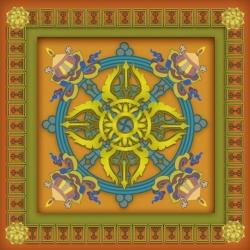Difference between revisions of "སྟོབས་"
Jump to navigation
Jump to search
(Created page with "{{DisplayImages|{{Random number}}}} {{Dictkey|སྟོབས།}} (Wyl. ''stobs '') {{Color|#808080|''Pron.:'' tob}}* ''Skt.'' {{SanskritBig|बलम्}}, bal...") |
|||
| Line 1: | Line 1: | ||
{{DisplayImages|{{Random number}}}} | {{DisplayImages|{{Random number}}}} | ||
| − | {{Dictkey|སྟོབས།}} ([[Wyl.]] ''[[stobs]] '') {{Color|#808080|''Pron.:'' tob}}* ''Skt.'' {{SanskritBig|[[बलम्]]}}, [[bala]], {{Color|#006060|''Pron.:'' bala}}. From {{Color|#006060|''Sanskrit:''}} power, strength, might, vigour, force, validity | 'forcibly, against one's will, without being able to help it' | also | or | with | or | force or power of articulation | force considered as a sixth organ of action | the [[Buddhists]] reckon 10 forces, the ascetic Śaivas four, which according to | on | [B.] are | and | Force personified as one of the Viśve-Devāḥ | power of, expertness in | stoutness, bulkiness | also | military force, troops, an army | also shape | body | semen virile | gum | blood | a young shoot | bone | a crow | Crataeva Roxburghii | half-ripe barley | N. of a demon conquered by Indra | the brother of Vṛitra, in older texts | of an elder brother of Kṛishṇa (also called Bala-deva, Balabhadra, Bala-rāma) | N. of a son of Varuṇa and brother of Surā | of an attendant on Skanda | of a son of Añgiras | of a son of Parikshit | of a son of Parijātra | of a son of Kṛishṇa | of a lexicographer | also written | of a horse of the Moon | + | {{Dictkey|སྟོབས།}} ([[Wyl.]] ''[[stobs]] '') {{Color|#808080|''Pron.:'' tob}} |
| + | * ''Skt.'' {{SanskritBig|[[बलम्]]}}, [[bala]], {{Color|#006060|''Pron.:'' bala}}. From {{Color|#006060|''Sanskrit:''}} power, strength, might, vigour, force, validity | 'forcibly, against one's will, without being able to help it' | also | or | with | or | force or power of articulation | force considered as a sixth organ of action | the [[Buddhists]] reckon 10 forces, the ascetic Śaivas four, which according to | on | [B.] are | and | Force personified as one of the Viśve-Devāḥ | power of, expertness in | stoutness, bulkiness | also | military force, troops, an army | also shape | body | semen virile | gum | blood | a young shoot | bone | a crow | Crataeva Roxburghii | half-ripe barley | N. of a demon conquered by Indra | the brother of Vṛitra, in older texts | of an elder brother of Kṛishṇa (also called Bala-deva, Balabhadra, Bala-rāma) | N. of a son of Varuṇa and brother of Surā | of an attendant on Skanda | of a son of Añgiras | of a son of Parikshit | of a son of Parijātra | of a son of Kṛishṇa | of a lexicographer | also written | of a horse of the Moon | ||
==Further Information==* [[Ten paramitas]] | ==Further Information==* [[Ten paramitas]] | ||
{{RigpaWiki}} | {{RigpaWiki}} | ||
{{TibetanLetters}} | {{TibetanLetters}} | ||
Revision as of 06:04, 1 April 2014
སྟོབས། (Wyl. stobs ) Pron.: tob
- Skt. बलम्, bala, Pron.: bala. From Sanskrit: power, strength, might, vigour, force, validity | 'forcibly, against one's will, without being able to help it' | also | or | with | or | force or power of articulation | force considered as a sixth organ of action | the Buddhists reckon 10 forces, the ascetic Śaivas four, which according to | on | [B.] are | and | Force personified as one of the Viśve-Devāḥ | power of, expertness in | stoutness, bulkiness | also | military force, troops, an army | also shape | body | semen virile | gum | blood | a young shoot | bone | a crow | Crataeva Roxburghii | half-ripe barley | N. of a demon conquered by Indra | the brother of Vṛitra, in older texts | of an elder brother of Kṛishṇa (also called Bala-deva, Balabhadra, Bala-rāma) | N. of a son of Varuṇa and brother of Surā | of an attendant on Skanda | of a son of Añgiras | of a son of Parikshit | of a son of Parijātra | of a son of Kṛishṇa | of a lexicographer | also written | of a horse of the Moon
==Further Information==* Ten paramitas
